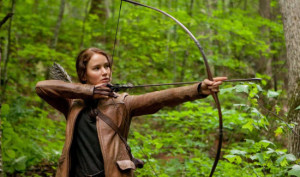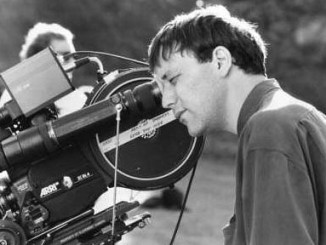 For years, fans of the Japanese film Battle Royale have been concerned that a Hollywood studio would remake the controversial film and in the process water down its powerful story of a government which forces children to fight to the death in an annual competition as a means of controlling the populace. Perhaps they can rest a little easier as Hollywood has just made a shallow film around that premise and it is called The Hunger Games.
For years, fans of the Japanese film Battle Royale have been concerned that a Hollywood studio would remake the controversial film and in the process water down its powerful story of a government which forces children to fight to the death in an annual competition as a means of controlling the populace. Perhaps they can rest a little easier as Hollywood has just made a shallow film around that premise and it is called The Hunger Games.
I know that I am not the first to draw a parallel between Kinji Fukasaku‘s film (and the novel it was based on by Koushun Takami) and Suzanne Collin‘s trio of novels. And it is because of those reported similarities, which Collins denied previously knowledge of, that actually kept me from approaching the books. This leaves me in the position of being able to evaluate the film adaption on its merits as a film. And unfortunately, when held up against other films that tackle similar subject matter, it comes up rather lacking.
The time is somewhere in the future. North America is now the country of Panem and is divided into a number of Districts around a central Capitol. As punishment for an uprising against the Capitol three-quarters of a century earlier, all the Districts are annually required to send two “tributes,” a boy and a girl between the ages of 12 and 18, to compete in “the Hunger Games,” a battle to the death in a giant, miles-wide arena.
Katniss (Jennifer Lawerence) and Peeta (Josh Hutcherson) are this year’s tributes from the poor, coal-mining District 12. They are whisked away to the Capitol where citizens look like the refugees from a particularly badly designed Baz Luhrman film had babies with the cast-offs of Lady Gaga’s wardrobe. There they are prepared for the Games by Cinna (Lenny Kravitz) a designer who helps make them look presentable for the televised pageantry of the Games and Haymitch (Woody Harrelson), an alcoholic, former Games winner assigned to train them for what is to come. But no amount of training prepares Katniss and Peeta for what will happen once they step forth into the arena and the Games begin.
 If you think that this is a rather dark premise for a film based on a young adult novel, don’t worry. The movie tends to shy away from its horrific premise, pulling back from the violence and immorality of the situation. Where the Bourne films would use rapidly jerking camerawork as a means to place you in the intensity of their violent moments, it feels as if director Gary Ross is hiding this film’s violence behind shaky camerawork, attempting to somewhat obscure the cold brutality of what is happening. Additionally, outside of Katniss and Peets there are only two other game participants that get any amount of characterization at all with the rest just relegated to the status of glorified extras. As human props and cannon fodder for the plot, they don’t invoke any emotion when they are killed.
If you think that this is a rather dark premise for a film based on a young adult novel, don’t worry. The movie tends to shy away from its horrific premise, pulling back from the violence and immorality of the situation. Where the Bourne films would use rapidly jerking camerawork as a means to place you in the intensity of their violent moments, it feels as if director Gary Ross is hiding this film’s violence behind shaky camerawork, attempting to somewhat obscure the cold brutality of what is happening. Additionally, outside of Katniss and Peets there are only two other game participants that get any amount of characterization at all with the rest just relegated to the status of glorified extras. As human props and cannon fodder for the plot, they don’t invoke any emotion when they are killed.
Does this sanitization suggest that the filmmakers hope audience will be as vacuous and as amoral thrill seekers as the residents of the Capital and we should enjoy the spectacle of the Games and ignore the deeper implications? I hope not, but the film’s lack of thematic depth seems to argue against me.
Thematically, the film is rather threadbare. The morality of “bread and circuses” is briefly, and fairly obviously, touched upon here, but quite frankly has been done better in a number of other treatments from Merian C. Cooper’s 1932 adaption of Richard Connell’s famous short story “The Most Dangerous Game” to an episode of the original Star Trek television series and the aforementioned Battle Royale. Now I am not arguing that the film should have been necessarily gorier. Cooper’s Most Dangerous Game is visually much tamer than this but still manages to have more to say than Hunger Games does. Ross has missed the opportunity to explore much of what the material suggests and instead just delivers more of a surface read of the premise.
Granted, the film does manage to at least echo some of the “99% versus the 1%” sentiment of the Occupy Movement, though considering that the source novel was published in 2009 that is probably more through happenstance than by intended design. And while a chance to critique reality television is also lost, Stanley Tucci and Toby Jones as the unctuous hosts of the televised games deliver enjoyable performances.
The screenplay has a number of plot and character motivation problems that may or may not be explained in Collins’s novel – Besides continually living, what does the winner get? What possible penalties ensure that tributes actually try and play the game? How did Cinna know about the significance of Katniss’s pin? Are we to assume that the parachuted supplies are made possible by the “Sponsors” that were mentioned? Why was Haymitch such a lush? Was it due to what he saw when he participated in the Games or had he succumbed to the decadence of life in the Capitol? Do the citizens know how the officials manipulate the conditions of the game? Were those giant dogs holograms, real or some kind of Star Trek holodeck construct? Will the Boy Scouts sue for having their salute stolen for the film? Some of these questions may have been answered in more depth in the book, but for them to be shorthanded here is just sloppy filmmaking.
 Additionally, I found it hard to connect to any of the characters in the film. Lawrence does an amazing job with the material given to her, more so than most anyone else appearing in other recent teen-lit film series. Especially effective were her scenes involving her acting as protector for her younger sister and the moments just before she enters into the Hunger Games arena. But I never found myself invested very much in her or any of the other characters’ plights. Granted, I am probably not the film’s core demographic, but that hasn’t stopped me from becoming invested in other films where I lie outside of the intended audience.
Additionally, I found it hard to connect to any of the characters in the film. Lawrence does an amazing job with the material given to her, more so than most anyone else appearing in other recent teen-lit film series. Especially effective were her scenes involving her acting as protector for her younger sister and the moments just before she enters into the Hunger Games arena. But I never found myself invested very much in her or any of the other characters’ plights. Granted, I am probably not the film’s core demographic, but that hasn’t stopped me from becoming invested in other films where I lie outside of the intended audience.
Ultimately, this film and the inevitable sequels are going to make sacks of money. I have to wonder if they will become classics rewatched and discussed for years to come or if they will just fade away like so many other brief but wildly popular pop culture fads. But I’m not sure that the odds will forever be in the franchise’s favor.


